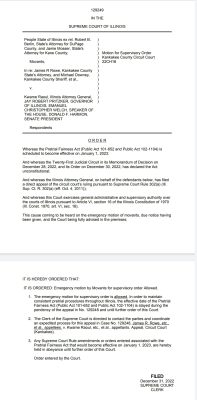In a last minute ruling today, the Illinois Supreme Court put a stay on implementation of the Pretrial Fairness Act statewide.
On Wednesday night, Kankakee County Judge Thomas Cunnington ruled that the Pretrial Fairness Act portion of the SAFE-T Act was unconstitutional after a combined lawsuit was brought by sheriffs and state’s attorneys from over 60 counties in the state.
Cunnington ruled that the law, set to take effect tomorrow January 1st, unconstitutionally amended the Illinois State Constitution’s provision that allows “all persons shall be bailable by sufficient sureties” that are to be set at the judge’s discretion in the local court system. Cunnington wrote in his ruling that if the General Assembly wanted to change provisions of the State Constitution, they should have submitted the questions to the electorate on the ballot as a referendum.
Morgan County State’s Attorney Gray Noll said on Thursday that he was going to have speak with Chief Judge Chris Reif about how the local court system would proceed with Morgan County enjoined into that lawsuit. Cass County State’s Attorney Craig Miller called Cunnington’s decision a win: “We were a county that filed with the lawsuit. We are one of the 65 counties that are no longer bound by the provision of no cash bail under the SAFE-T Act. I would consider that a win. We will be operating as we would have without the SAFE-T Act in place, meaning we will still be setting cash bail. Until we here otherwise from the Supreme Court or the legislature, that’s how we’ll proceed.”
Now, the entire State of Illinois will wait on if the Pretrial Fairness Act will be implemented. In its ruling tonight, the State Supreme Court granted an emergency motion filed by the state’s attorneys of DuPage and Kane counties that asked the court to provide clarity for consistent pretrial proceedings throughout the state. In the ruling today, the court granted the motion on those grounds so that no counties would treat pretrial procedures differently while the body of the lawsuit is worked out.
Illinois Attorney General Kwame Raoul expressed his frustrations last night after the Kankakee County Court ruling. Several counties issued temporary restraining orders to stop enforcement of the entire SAFE-T ACT. He called the multiple restraining orders on the final business day before the law was set to be implemented an abuse of the judicial system: “Beginning [Friday] morning, the Attorney General’s office received new complaints and motions for temporary restraining orders (TROs) from state’s attorneys and sheriffs throughout Illinois who are seeking to prevent the SAFE-T Act from going into effect. To be clear, these motions were filed on the last business day before Jan. 1, when the SAFE-T Act will go into effect.
“In some of these TRO motions, plaintiffs are asking that the Attorney General’s office be enjoined from enforcing any provision of the SAFE-T Act, not just the pretrial release provisions. Many of these provisions have been in effect for more than a year; however, my office received less than one hour’s notice of hearings in some counties and no notice at all in others. Throughout the day, we continued to learn of plaintiffs having obtained TROs without giving our office notice or providing copies of the complaints or TRO motions. To say that this is an abuse of the judicial process is an understatement. The SAFE-T Act has been the law in Illinois since January 2021, giving these plaintiffs nearly two years to raise challenges. In fact, the plaintiffs have had since October to join the lawsuits consolidated in Kankakee County. It is outrageous that the plaintiffs instead chose to sit on their hands until the last business day before the SAFE-T Act is to go into effect, and then seek to enjoin it from going into effect.”
Approximately one hour after the ruling by Judge Cunnington was issued, Governor J.B. Pritzker called it a major setback: “Today’s ruling is a setback for the principles we fought to protect through the passage of the SAFE-T Act. The General Assembly and advocates worked to replace an antiquated criminal justice system with a system rooted in equity and fairness. We cannot and should not defend a system that fails to keep people safe by allowing those who are a threat to their community the ability to simply buy their way out of jail. I thank the Attorney General for his work on this case and look forward to the Illinois Supreme Court taking up the appeal as soon as possible.”
Other provisions of the SAFE-T Act beside the pretrial fairness/no cash bail portion have been in effect for more than a year. Those provisions will remain in place despite the stay on the Pretrial Fairness Act.
An emergency appeal filed by the Attorney General’s Office is expected to be heard sometime early next week after the New Years holiday.




